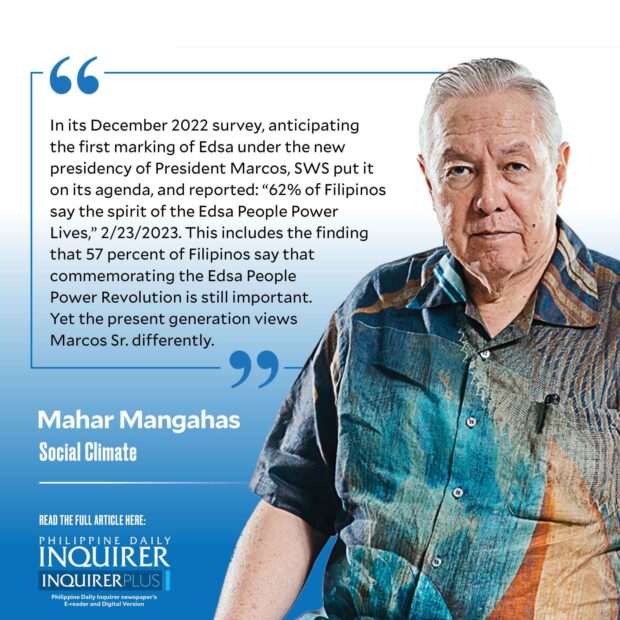64% voted for Cory in 1986

The most memorable national surveys of relevance to the Edsa People Power Revolution of 1986 were the 1984 and 1985 sociopolitical polls by the Bishops-Businessmen’s Conference for Human Development (BBC) and the June 1986 public opinion survey jointly done by Social Weather Stations (SWS) and Ateneo de Manila University.
The dictatorship was already strongly resented in 1984-85. Though done during Marcos’ dictatorship, the BBC polls got presented in public only by hiding, so to speak, behind the skirts of Cardinal Sin—who literally sat at the head table during the presentation. I wrote: “The BBC polls’ findings that two of every three Filipinos opposed Marcos’ legislation by decree and detention of persons by fiat were suppressed by pro-government media like the Daily Express, and came out only in media like Mr. & Ms. magazine and the foreign press [italics mine]. Marcos was tolerant because he would misrepresent the 1985 BBC poll as showing that he would win if he ran for president again.” (see “The First SWS Public Opinion Report,” 8/6/11)
Poverty exploded to 74 percent in 1985. The July 1985 BBC poll also made the shocking discovery that Self-Rated Poverty (SRP) was at 74 percent of all families! This 19-point pole-vault from only 55 percent in April 1983—as surveyed by the Development Academy of the Philippines—was clearly due to the hyperinflation of 50 percent in 1984 and 25 percent in 1985; it is still the highest poverty rate of the last four decades. (The 1984 BBC poll did not include SRP. For the full SRP time-series of 1983-2023, see “47% of Filipino families feel Poor, similar to 48% in September 2023; 33% feel Borderline, and 20% feel Not-Poor,” www.sws.org.ph, 1/17/24.)
Article continues after this advertisementThe 1986 poll scored the snap election at 64 for Cory, 27 for Marcos. From “The First SWS Public Opinion Report”: “When the SWS-Ateneo steering committee mulled over its first survey agenda, there was a discussion on whether to include the question: ‘For whom did you vote in the snap election of February 1986?’ Suppose, someone said, the majority answered that they had voted for Marcos? I am proud to recall that the discussion was short. We did not shrink from using the scientific tool at our disposal to search for the truth about the people’s will in the snap election.”
From “The social climate in 1986,” (2/26/11): “Namfrel was more credible. Sixty-five percent agreed, and only 15 percent disagreed, that ‘Namfrel helped a lot in making the 1986 election clean.’ Thirty-nine percent agreed and 33 percent disagreed that ‘In the last election, the Comelec performed its job independently.’ The Namfrel count was derided by the Marcos government as incomplete and inaccurate; it was the Comelec count that got publicized.
“The SWS-Ateneo poll asked, ‘As far as you know, who won in the counting for the presidency here in your precinct,’ and obtained: Aquino 70 percent, Marcos 26 percent. Thus the great majority saw Cory Aquino as the winner in their own areas; but they could not know if she was also the winner in the entire country.
Article continues after this advertisement“The poll did not ask whom the respondents saw as the national winner. Instead, it asked those who had voted: ‘We realize that every citizen has the right to keep in confidence who he or she voted for as president in the last election. But we would like to know the true count. Can you please indicate your vote in this paper where nobody will see it and drop it in this box?’ … The result was: Aquino 64 percent, Marcos 27 percent, and 9 percent no answer. It strongly supports the Namfrel conclusion that Cory Aquino was the real winner.”
President Corazon Aquino was immediately very popular. The June 1986 survey found President Cory’s initial net satisfaction rating at a Very Good +53. In October 1986—at that time the SWS surveys were done only twice a year—she reached net +72, which stood as the presidential record-high until late 2019. The spirit of Edsa 1986 is alive up to now. In its December 2022 survey, anticipating the first marking of Edsa under the new presidency of President Marcos, SWS put it on its agenda, and reported: “62% of Filipinos say the spirit of the Edsa People Power Lives,” 2/23/2023. This includes the finding that 57 percent of Filipinos say that commemorating the Edsa People Power Revolution is still important. Yet the present generation views Marcos Sr. differently. For how Filipinos have moved on, based on SWS surveys of late 1986, 1995, 2016, and 2022, see “They never left: popular impressions of Ferdinand E. Marcos as President after February 1986,” by SWS fellows Jorge Tinio, Geoffrey Ducanes, Steven Rood, and Vladymir Joseph Licudine, 9/27/23 (presentation on the website).
READ: Cory Aquino on my mind
Contact: mahar.mangahas@sws.org.ph.
















